Unit 4 - 6 RevisIon 复习课件(共有13PPT)
文档属性
| 名称 | Unit 4 - 6 RevisIon 复习课件(共有13PPT) | 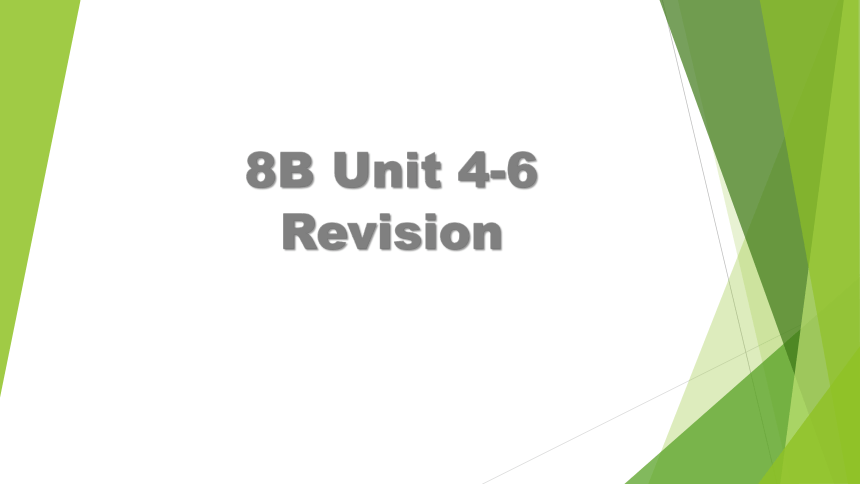 | |
| 格式 | zip | ||
| 文件大小 | 113.4KB | ||
| 资源类型 | 教案 | ||
| 版本资源 | 牛津译林版 | ||
| 科目 | 英语 | ||
| 更新时间 | 2022-04-16 20:12:58 | ||
图片预览

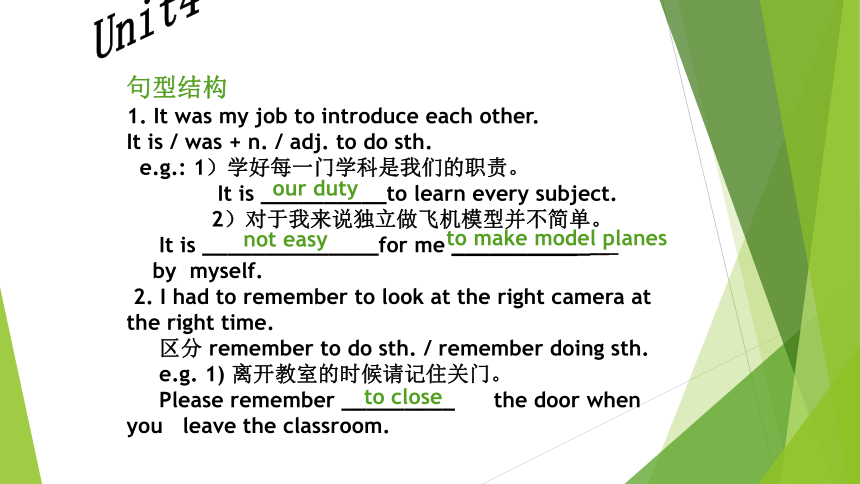
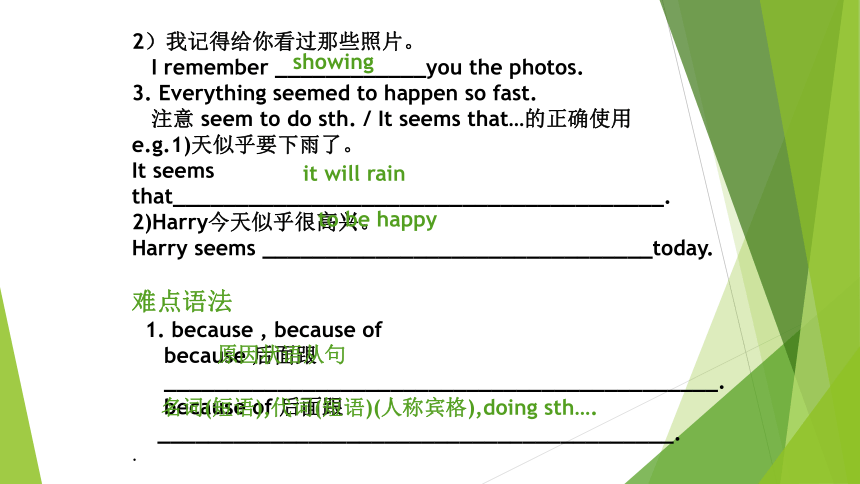
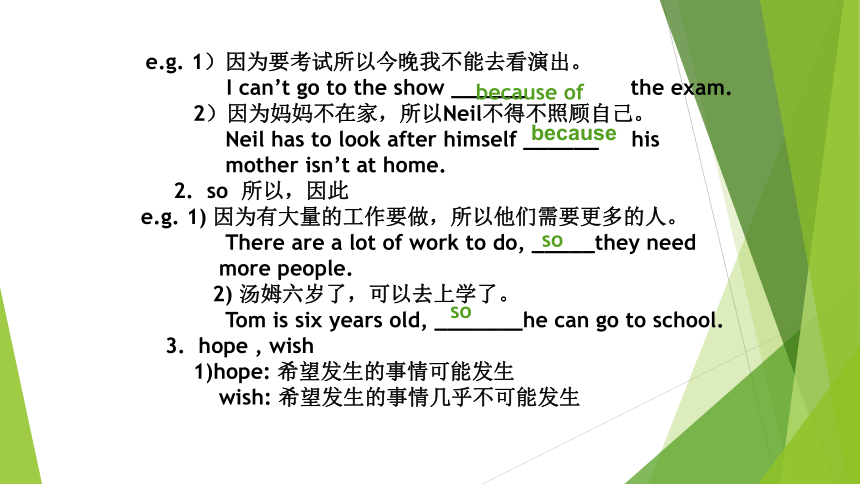
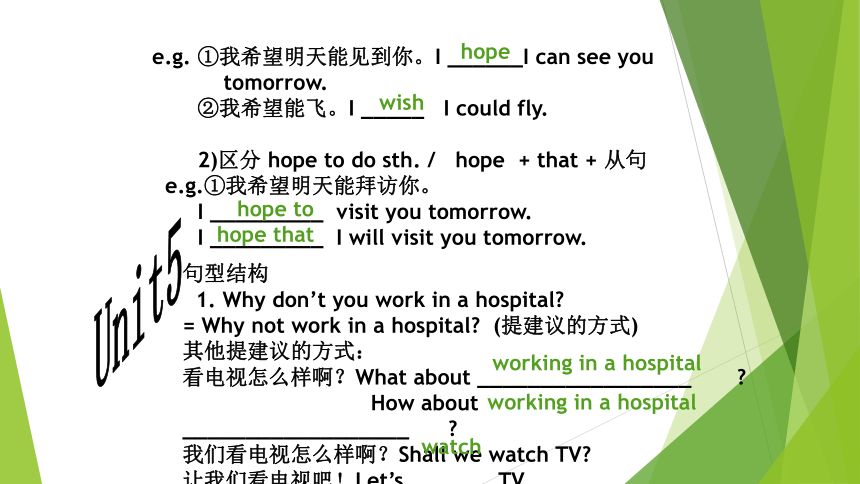
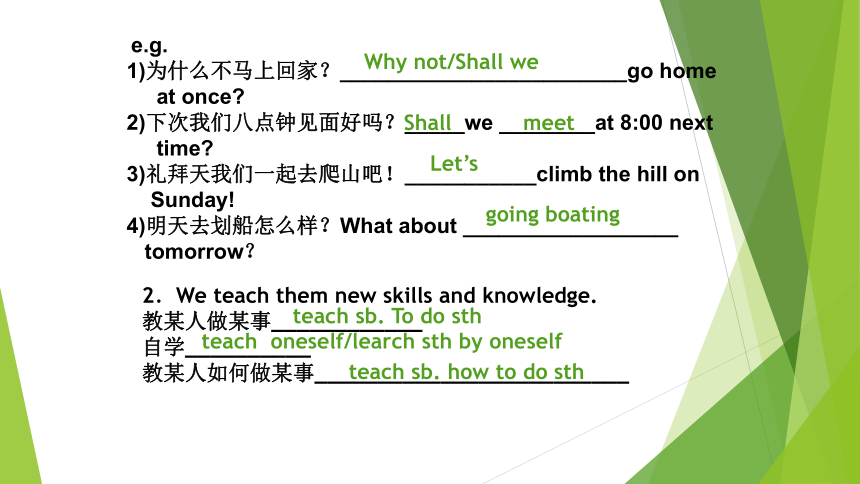
文档简介
(共13张PPT)
8B Unit 4-6
Revision
Unit4
句型结构
1. It was my job to introduce each other.
It is / was + n. / adj. to do sth.
e.g.: 1)学好每一门学科是我们的职责。
It is __________to learn every subject.
2)对于我来说独立做飞机模型并不简单。
It is ______________for me ______________
by myself.
2. I had to remember to look at the right camera at the right time.
区分 remember to do sth. / remember doing sth.
e.g. 1) 离开教室的时候请记住关门。
Please remember _________ the door when you leave the classroom.
our duty
not easy
to make model planes
to close
2)我记得给你看过那些照片。
I remember ____________you the photos.
3. Everything seemed to happen so fast.
注意 seem to do sth. / It seems that…的正确使用
e.g.1)天似乎要下雨了。
It seems that_______________________________________.
2)Harry今天似乎很高兴。
Harry seems _______________________________today.
难点语法
1. because , because of
because 后面跟
____________________________________________.
because of 后面跟
_________________________________________.
.
showing
it will rain
to be happy
原因状语从句
名词(短语),代词(短语)(人称宾格),doing sth….
e.g. 1)因为要考试所以今晚我不能去看演出。
I can’t go to the show ______ the exam.
2)因为妈妈不在家,所以Neil不得不照顾自己。
Neil has to look after himself ______ his
mother isn’t at home.
2. so 所以,因此
e.g. 1) 因为有大量的工作要做,所以他们需要更多的人。
There are a lot of work to do, _____they need
more people.
2) 汤姆六岁了,可以去上学了。
Tom is six years old, _______he can go to school.
3. hope , wish
1)hope: 希望发生的事情可能发生
wish: 希望发生的事情几乎不可能发生
because of
because
so
so
e.g. ①我希望明天能见到你。I ______I can see you
tomorrow.
②我希望能飞。I _____ I could fly.
2)区分 hope to do sth. / hope + that + 从句
e.g.①我希望明天能拜访你。
I _________ visit you tomorrow.
I _________ I will visit you tomorrow.
hope
wish
hope to
hope that
句型结构
1. Why don’t you work in a hospital
= Why not work in a hospital (提建议的方式)
其他提建议的方式:
看电视怎么样啊?What about _________________
How about __________________
我们看电视怎么样啊?Shall we watch TV
让我们看电视吧!Let’s _______TV.
Unit5
working in a hospital
working in a hospital
watch
e.g.
1)为什么不马上回家?________________________go home
at once
2)下次我们八点钟见面好吗?_____we ________at 8:00 next
time
3)礼拜天我们一起去爬山吧!___________climb the hill on
Sunday!
4)明天去划船怎么样?What about __________________
tomorrow?
2.We teach them new skills and knowledge.
教某人做某事____________
自学__________ 教某人如何做某事_________________________
Why not/Shall we
Shall meet
Let’s
going boating
teach sb. To do sth
teach oneself/learch sth by oneself
teach sb. how to do sth
e.g.
马先生教我们怎样学好英语?
Mr. Ma ________us ________learn English well.
谁正在教你游泳? 我自学。
Who is ________you __________ I’m_____________.
Many of our patients are so poor that they don’t have the money to travel to hospital.
注意: so…that, too..to… , adj. + enough + to do …
e.g.
这个小孩太小了不能去上学。
①The child is _______young _______ he can’t go to school.
②The child is _______young _______ go to school.
③The child isn’t_________________ go to school.
他个子很高能够得着树上的苹果。
①He is ___________ he can reach the apples on the tree.
②He is ___________ to reach the apple son the tree.
teaches how to
teaching to swim teaching myself
so that
too to
od enough to
so tall that
tall enough
难点语法
1. 间接引语
我们用间接引语转述他人说的话。如果所转述的信息依然是
真实的或_________,那我们在转述时就不需要改变时态,但
有可能要改变______.
e.g.
1) 李女士说:“我们需要的是时间。”
Mrs. Li said, ‘What we need is time. ’
→ Mrs. Li said what ______ need is time.
2)老师告诉我们:“太阳比月球大。”
The teacher told us, ‘The sun is bigger than the moon.’
→The teacher told us the sun ______bigger than the moon.
客观实在
they
is
人称
2. used to…, be used to…
e.g.
1)过去我在一家医院工作。I _________in a hospital.
2)医生们现在习惯在飞机上给病人动手术了。
The doctors _______________on patients on a plane.
3)大多数的学生现在习惯学校生活了。
Most students ____________school life.
Unit6
句型结构
1. Oxfam Trailwalker has been one of Hongkong’s biggest fun-raising events since 1981.
注意:be 是, 成为
在现在完成时的句子中动词可能是短暂性动词也可能延续性动词。短暂性动词可以用于现在完成时,但不可以和一段时间连用。
1)常见的相对应的短暂性动词和延续性动词
arrive , come be here , be in
begin, start be on
buy have
die be dead
finish be over
get to know know
fall asleep be asleep
get up be up
join be in , be a +n.
leave be away, be out of
短暂性动词 延续性动词
e.g.
1)我已经来了。(come) ________________________________________
2)我来了十分钟了。( be here ) _________________________________
3)这本书是我去年买的。( buy ) ________________________________
4)这些杂志他们已经买了一个星期了。( have)
_______________________________________________
5)Susan的外公两年前去世的。( die)
______________________________________________
6)Susan的外公去世已有两年了。( be dead )
_______________________________________________
I have come.
I have been here for ten minutes.
I bought this book last year.
They have had the magazines for a week.
Susan’s grandpa died two years ago.
Susan’s grandpa has been dead for two years.
2.The money is used to help poor people.
区分 used to…, be used to…, be used by…, .be used to do…
e.g.
1)Bill 过去常常放学后踢足球。
Bill ____________play football after school.
2)Kate现在习惯了这份枯燥的工作了。
Kate _______________the boring work.
3)小刀是用来切东西的。
Knives __________ cut things.
4)刚才他们使用了这台机器。
The machine ____________ them.
难点语法
1. It is + adj. + that …
2. It is + adj. + to do…
3. It is + adj. +for sb. + to do…
used to
is used to
are used to
was used by
e.g.
每天喝足够的水是必要的。
________________________________________________.
对于盲人来说,独自在超市购物是困难的。
________________________________________________.
每天听新闻是有用的。
________________________________________________.
现在大多数学生早睡是不可能的。
________________________________________________.
It is necessary to drink enough water.
It is hard for the blind to do shopping in the supermarket.
It is useful to listen to news every day.
It is not possible for most students to go to bed early.
8B Unit 4-6
Revision
Unit4
句型结构
1. It was my job to introduce each other.
It is / was + n. / adj. to do sth.
e.g.: 1)学好每一门学科是我们的职责。
It is __________to learn every subject.
2)对于我来说独立做飞机模型并不简单。
It is ______________for me ______________
by myself.
2. I had to remember to look at the right camera at the right time.
区分 remember to do sth. / remember doing sth.
e.g. 1) 离开教室的时候请记住关门。
Please remember _________ the door when you leave the classroom.
our duty
not easy
to make model planes
to close
2)我记得给你看过那些照片。
I remember ____________you the photos.
3. Everything seemed to happen so fast.
注意 seem to do sth. / It seems that…的正确使用
e.g.1)天似乎要下雨了。
It seems that_______________________________________.
2)Harry今天似乎很高兴。
Harry seems _______________________________today.
难点语法
1. because , because of
because 后面跟
____________________________________________.
because of 后面跟
_________________________________________.
.
showing
it will rain
to be happy
原因状语从句
名词(短语),代词(短语)(人称宾格),doing sth….
e.g. 1)因为要考试所以今晚我不能去看演出。
I can’t go to the show ______ the exam.
2)因为妈妈不在家,所以Neil不得不照顾自己。
Neil has to look after himself ______ his
mother isn’t at home.
2. so 所以,因此
e.g. 1) 因为有大量的工作要做,所以他们需要更多的人。
There are a lot of work to do, _____they need
more people.
2) 汤姆六岁了,可以去上学了。
Tom is six years old, _______he can go to school.
3. hope , wish
1)hope: 希望发生的事情可能发生
wish: 希望发生的事情几乎不可能发生
because of
because
so
so
e.g. ①我希望明天能见到你。I ______I can see you
tomorrow.
②我希望能飞。I _____ I could fly.
2)区分 hope to do sth. / hope + that + 从句
e.g.①我希望明天能拜访你。
I _________ visit you tomorrow.
I _________ I will visit you tomorrow.
hope
wish
hope to
hope that
句型结构
1. Why don’t you work in a hospital
= Why not work in a hospital (提建议的方式)
其他提建议的方式:
看电视怎么样啊?What about _________________
How about __________________
我们看电视怎么样啊?Shall we watch TV
让我们看电视吧!Let’s _______TV.
Unit5
working in a hospital
working in a hospital
watch
e.g.
1)为什么不马上回家?________________________go home
at once
2)下次我们八点钟见面好吗?_____we ________at 8:00 next
time
3)礼拜天我们一起去爬山吧!___________climb the hill on
Sunday!
4)明天去划船怎么样?What about __________________
tomorrow?
2.We teach them new skills and knowledge.
教某人做某事____________
自学__________ 教某人如何做某事_________________________
Why not/Shall we
Shall meet
Let’s
going boating
teach sb. To do sth
teach oneself/learch sth by oneself
teach sb. how to do sth
e.g.
马先生教我们怎样学好英语?
Mr. Ma ________us ________learn English well.
谁正在教你游泳? 我自学。
Who is ________you __________ I’m_____________.
Many of our patients are so poor that they don’t have the money to travel to hospital.
注意: so…that, too..to… , adj. + enough + to do …
e.g.
这个小孩太小了不能去上学。
①The child is _______young _______ he can’t go to school.
②The child is _______young _______ go to school.
③The child isn’t_________________ go to school.
他个子很高能够得着树上的苹果。
①He is ___________ he can reach the apples on the tree.
②He is ___________ to reach the apple son the tree.
teaches how to
teaching to swim teaching myself
so that
too to
od enough to
so tall that
tall enough
难点语法
1. 间接引语
我们用间接引语转述他人说的话。如果所转述的信息依然是
真实的或_________,那我们在转述时就不需要改变时态,但
有可能要改变______.
e.g.
1) 李女士说:“我们需要的是时间。”
Mrs. Li said, ‘What we need is time. ’
→ Mrs. Li said what ______ need is time.
2)老师告诉我们:“太阳比月球大。”
The teacher told us, ‘The sun is bigger than the moon.’
→The teacher told us the sun ______bigger than the moon.
客观实在
they
is
人称
2. used to…, be used to…
e.g.
1)过去我在一家医院工作。I _________in a hospital.
2)医生们现在习惯在飞机上给病人动手术了。
The doctors _______________on patients on a plane.
3)大多数的学生现在习惯学校生活了。
Most students ____________school life.
Unit6
句型结构
1. Oxfam Trailwalker has been one of Hongkong’s biggest fun-raising events since 1981.
注意:be 是, 成为
在现在完成时的句子中动词可能是短暂性动词也可能延续性动词。短暂性动词可以用于现在完成时,但不可以和一段时间连用。
1)常见的相对应的短暂性动词和延续性动词
arrive , come be here , be in
begin, start be on
buy have
die be dead
finish be over
get to know know
fall asleep be asleep
get up be up
join be in , be a +n.
leave be away, be out of
短暂性动词 延续性动词
e.g.
1)我已经来了。(come) ________________________________________
2)我来了十分钟了。( be here ) _________________________________
3)这本书是我去年买的。( buy ) ________________________________
4)这些杂志他们已经买了一个星期了。( have)
_______________________________________________
5)Susan的外公两年前去世的。( die)
______________________________________________
6)Susan的外公去世已有两年了。( be dead )
_______________________________________________
I have come.
I have been here for ten minutes.
I bought this book last year.
They have had the magazines for a week.
Susan’s grandpa died two years ago.
Susan’s grandpa has been dead for two years.
2.The money is used to help poor people.
区分 used to…, be used to…, be used by…, .be used to do…
e.g.
1)Bill 过去常常放学后踢足球。
Bill ____________play football after school.
2)Kate现在习惯了这份枯燥的工作了。
Kate _______________the boring work.
3)小刀是用来切东西的。
Knives __________ cut things.
4)刚才他们使用了这台机器。
The machine ____________ them.
难点语法
1. It is + adj. + that …
2. It is + adj. + to do…
3. It is + adj. +for sb. + to do…
used to
is used to
are used to
was used by
e.g.
每天喝足够的水是必要的。
________________________________________________.
对于盲人来说,独自在超市购物是困难的。
________________________________________________.
每天听新闻是有用的。
________________________________________________.
现在大多数学生早睡是不可能的。
________________________________________________.
It is necessary to drink enough water.
It is hard for the blind to do shopping in the supermarket.
It is useful to listen to news every day.
It is not possible for most students to go to bed early.
